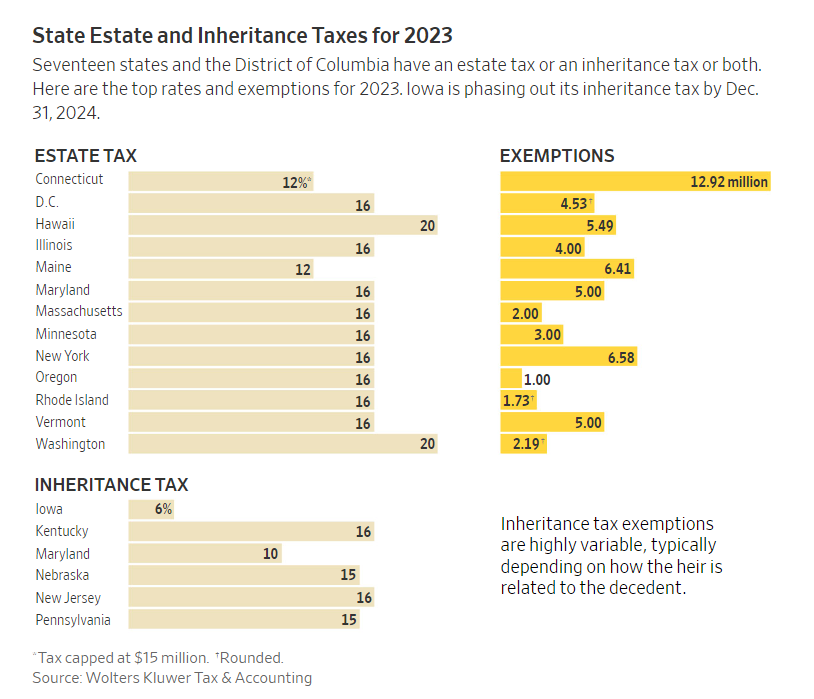
By Ashlea Ebeling
Nov. 20, 2023
Karl Yee was about to pay a nearly $112,000 Massachusetts tax bill for his late mother’s estate when he got a reprieve from the governor. A retroactive change to the state’s estate-tax law had dropped the estate’s bill to $12,000.
“Hallelujah!” he said, after hearing the news.

Karl Yee in the Brookline, Mass., home he shared with his late mother, Sue Kue Yee, who died in January. A retroactive estate-tax law change meant $100,000 in tax savings.
While the federal estate tax hits only the wealthiest Americans, the thresholds for state estate and inheritance taxes are generally much lower. These taxes can cost heirs tens of thousands of dollars they aren’t expecting to pay, along with the grief of figuring out how to pay the bill when the bulk of an estate’s value is tied up in a house or business. The problem is especially acute now because of the recent meteoric rise in real-estate values.
As families like the Yees often learn too late, the state tax rules are complicated and subject to change, estate lawyers said.
Seventeen states and the District of Columbia have an estate tax, an inheritance tax or both. Generally, your estate will be subject to these taxes if you consider one of these places your permanent home or you have property there.
Estate taxes get levied at rates of up to 20% on estates over a certain threshold, known as the exemption amount. Estate-tax exemption amounts vary from $1 million to $12.92 million.
Inheritance taxes are slightly different. They aren’t levied on the estate, but the heirs. The much lower exemption amounts and tax rates depend on the heir’s relationship to the deceased.
Unmarried partners typically pay the top rate. In New Jersey, for example, if you leave your estate to a niece, nephew or unmarried partner, they are taxed at 15% on assets up to $700,000 and 16% on assets above $700,000.
There is no estate or inheritance tax when assets are left to a spouse who is a U.S. citizen.
Estates paid $6.7 billion in death and gift taxes at the state and local level in 2021, according to the Urban-Brookings Tax Policy Center. In Pennsylvania, close to 50,000 estates brought in some $1.5 billion in the 2022 fiscal year, according to the state department of revenue.
The threshold for an individual to owe federal estate taxes is $12.92 million, and it rises to $13.61 million for 2024. In 2021, 2,584 estates paid more than $18.4 billion in federal estate taxes. Only one state, Connecticut, matches the federal threshold.
Unlike the federal tax, a big share of state estate- and inheritance-tax revenue doesn’t come just from the wealthiest families, but from the large number of smaller estates subject to the levy.
The state estate tax wasn’t on the Yee family’s radar.
His mother, Suy Kue Yee, who worked as a union seamstress and his father, Bake Yee, a cook at a Chinese restaurant, immigrated from China when he was 8 months old. When his mother died in January, at age 93, she was living in the two-family home the couple bought for $43,000 in 1970.

The house, now appraised at $2.08 million, plus her bank account balances, put her estate in Massachusetts estate-tax territory. Karl and a sister are working out a deal to buy out their three siblings’ shares so they can stay in the house.
“Are people caught off guard? Yes,” says June Wiyrick Flores, an estate planning and administration lawyer in Portland, Ore.
When states change the threshold
Yee’s tax bill dropped when Massachusetts became the latest state to soften its estate-tax bite, doubling the exemption from $1 million to $2 million.
That leaves Oregon as the only state with a $1 million threshold. Its legislators passed a law retroactive to deaths as of July 1 that exempts up to $15 million of farm, forestry and fisheries property from its estate tax. That provision would have knocked about $100,000 off the estate-tax bill for a client who left his 60-acre fruit orchard to his son last year, Flores said.
States are also changing inheritance-tax rules.
Iowa is phasing out its inheritance tax after Dec. 31, 2024. Nebraska reduced its top inheritance-tax rate to 15% from 18%, effective Jan. 1, and eliminated taxes for heirs under 22. Efforts are under way to get a question on the 2024 ballot asking voters whether they want to ditch the tax altogether.
Richard Clements, an estate lawyer in Elmwood, Neb., is handling the estate of a mail carrier who died last year and left his farmhouse to his college-age niece and nephew. They had to take out an additional loan on the house to pay the $40,000 inheritance-tax bill. They are now selling, reluctantly, Clements said.
“Sentimentally, it would be nice to keep the house that their great-grandparents owned,” he said.
How to plan for state estate taxes
If you live in a state with an estate tax or expect to inherit from someone who does, here’s what to know:
Watch out for the estate-tax cliff. In New York, when the estate’s value is slightly higher than the exemption amount, the effective tax rate on the excess value is extraordinary, said Toni Ann Kruse, a private-client lawyer with McDermott Will & Emery in New York City. For an estate that is valued at $6.9 million, 5% above the $6.58 million New York exemption amount, the estate tax would be $626,000, a 9% effective tax rate but a 190% marginal rate on the excess.
For estates near the so-called cliff, taxpayers can give away assets to reduce the value of their estates before death, or include a clause in their will that directs any amount in excess of the exemption amount to charity, Kruse said.
Illinois has a similar cliff at $4 million. The new Massachusetts law eliminated its cliff, which is why the savings for the Yee estate was so dramatic.
Check for inflation adjustments. Some states, like Rhode Island which has a $1,733,264 exemption, increase the threshold each year in line with inflation. That helps keep more estates below the new thresholds, even as the value of the assets grows. In other states, like Illinois at $4 million, the amounts are static, snagging more estates as asset values rise.
Nonresidents can owe estate taxes. If you live in a state with no estate or inheritance tax but own property in a state that has one, you can still be on the hook for taxes.
Flores just completed an Oregon estate-tax return for a Nevada transplant who kept investments properties and his former home in Bend, Ore. The investment properties were shielded from Oregon taxes because they were held in a limited liability company. The son, who was the executor, was surprised that he had to pay Oregon estate taxes of about $65,000 on the $640,000 home, which wasn’t put in the LLC, Flores said.
Revisit your estate plan. In cases where real estate is a big part of the estate, and the heirs will want to hold on to it, think through how they will pay the tax.
“It can be a real cash crunch,” said Nikolaus Schuttauf, an estate lawyer in Boston.
Another wrinkle: In many states, for married couples to take full advantage of the exemption amounts for both spouses, their estate plans have to include trusts known as credit shelter trusts, he said.
Move out of state. The ultimate move to avoid state death duties is to move. Jeff Bezos recently said he was relocating from Seattle to Miami, a step that could shield his heirs from Washington state’s estate tax.
Write to Ashlea Ebeling at ashlea.ebeling@wsj.com
Dow Jones & Company, Inc.



